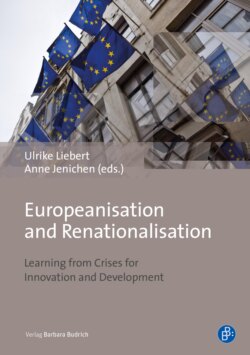Читать книгу Europeanisation and Renationalisation - Группа авторов - Страница 25
На сайте Литреса книга снята с продажи.
4. [49] Europeanisation or renationalisation? The Czech Republic facing the euro-, economic and refugee crises Vratislav Havlík 1. Introduction
ОглавлениеSince its accession to the European Union (EU) more than a decade ago, foreign observers have described the Czech Republic (CR) as a country holding (sometimes more, sometimes less) Eurosceptic positions. Even by 2016, the country, in contrast to some other European states, had not adopted the common European currency, the euro, and due to the positions of the Eurosceptic former President Václav Klaus, the CR was the last of all Member States to ratify the Lisbon Treaty. The right-conservative government of Petr Nečas also refused to support the “Fiscal Pact”, the EU instrument for resolving future economic crises. In connection with the so-called “Refugee Crisis”, Czech politicians in 2016 actively joined in the formation of a Central European anti-immigration coalition, raising their voices against European Union proposals for a quota system for the distribution of refugees.
These Eurosceptic phenomena are even more interesting if we compare the CR to the situation in other Member States. The country was not hit particularly hard by the economic crisis relative to other European states. This is particularly true if the economic (as opposed to political) impacts of the crisis are considered. The duration of economic decline and the following stagnation was relatively short and was soon compensated for by significant growth. Not only did industrial growth foster economic growth, also money from the EU's Structural Funds did. Despite initial scepticism, the country received the good news that after the lucrative years of 2006-2013, it would still gain substantial amounts in the future. The CR is and, at least until 2020, will be a net recipient EU Member State, and the drop in funds for EU Regional Policy for 2014-2020 has been rather small. Considering these points, it would not be reasonable to expect a massive expansion in Eurosceptic discourse in the CR. Yet, Euroscepticism has nonetheless developed also in the CR. As this phenomenon is interesting for international comparative studies of Europeanisation and accompanying trends of Eurosceptic populism, the Czech case must therefore be [50] further analysed. At first glance, the Czech case might seem paradoxical: in macroeconomic terms, the economic crisis was relatively moderate and short; yet it had significant consequences for the party system. These consequences were not necessarily direct; for instance, no single-issue anti-European party has established itself. The main trigger of change in the Czech party system was not so much the economic crisis itself as a broad dissatisfaction with how leaders sought to resolve it and other issues (cf. Hloušek/Kaniok 2014: 12). The electorate did not primarily call for parties that would solve EU issues differently; rather they called for new, non-traditional parties with fresh leadership. Indeed, the period since 2010 has been characterised by the Czechs’ turning away from traditional parties and their embracing of emerging political parties and movements.
The aim of this chapter is twofold. First, to describe the influence of the economic crisis on the Czech party system, and second, to describe the growth of party and public Euroscepticism as one of the consequences of the economic crisis. The analysis consists of six parts. The second part briefly presents some key economic and labour market data. The third part analyses the role of former President Václav Klaus in the context of the debate around the economic crisis. As a known Eurosceptic, Klaus emerged as an agenda setter in the debates surrounding the crisis, warned about the disadvantages of future adoption of the euro in CR, and emphatically contributed to the Czech government's opposition to the steps taken by the European Commission to prevent future crises. Klaus therefore took advantage of the Eurozone’s economic crisis to criticise the EU. In the fourth part, the reactions of political parties will be analysed. In this respect, attention will focus primarily on voters' dramatic shift away from the party which up to that point had been dominant, the ODS (Civic Democratic Party); to a certain extent this is also an indirect fallout from the economic crisis. Therefore, the topics of the stability of cleavages and the possible Europeanisation of patterns of party competition will also be discussed. The fifth part will focus on the Czech discussion concerned with the adoption of the euro; unlike the party system, this discussion was directly affected by the economic crisis. The sixth part will shed light on the position of the Czech public. The last part will examine the impacts of the ongoing migration crisis and compare them with the impacts of the economic crisis.
The argument developed in this chapter is based on (1) Eurobarometer and Czech Statistical Office data, (2) primary sources (newspaper articles and interviews, to map the public discourse) and (3) academic literature tracing the development of Czech Euroscepticism.
